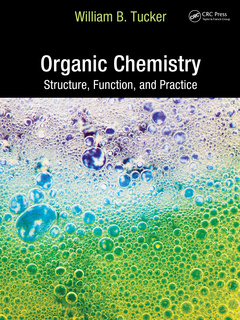Description
Organic Chemistry
Structure, Function, and Practice
Author: Tucker William B.
Language: English
Subjects for Organic Chemistry:
· 21x28 cm · Paperback
Description
/li>Contents
/li>Readership
/li>Biography
/li>
With a focus on organic chemistry students at all levels, problems are incorporated into the body of the text in an effort to engage students more directly in chemistry. Arrowless mechanisms seek to help students develop their electron-pushing skills and intuition through repeated practice. By design this volume is more actively engaging than a traditional textbook. In addition, the historical development of ideas is presented to help frame and center these concepts for the reader. Primary and summative sources are given for all topics covered. The sources provide definitive information for the reader and ensure that all information is supported by peer-reviewed, experimental sources.
Features:
- The development of key ideas is presented in their historical context.
- All information presented is supported through citations to chemical literature
- Problems are incorporated into the body of the text, including arrowless mechanisms which encourage students to engage more actively and to develop their electron-pushing skills and intuition.
- International Union of Pure and Applied Chemistry style and technical guidelines are followed throughout the text.
- The problems, text, and presentation are based on years of classroom refinement of teaching pedagogy.
Chapter 01 Introduction
Chapter 02 Electrons, bonding, and structure
Chapter 03 Alkanes, cycloalkanes, and nomenclature fundamentals
Chapter 04 Arrow pushing and solvent
Chapter 05 Radical reactions
Chapter 06 Stereochemistry
Chapter 07 Infrared spectroscopy
Chapter 08 Mass spectrometry
Chapter 09 Nuclear magnetic resonance
Chapter 10 Acids and bases
Chapter 11 Alkene structure and nomenclature
Chapter 12 Electrophilic addition to alkenes
Chapter 13 Reactions of alkynes
Chapter 14 Nucleophilic substitution and B-elimination reactions
Chapter 15 Alcohols
Chapter 16 Ethers and epoxides
Chapter 17 Organometallic chemistry: magnesium, lithium, copper, and carbenes
Chapter 18 Organometallic chemistry: palladium
Chapter 19 Aldehydes and ketones
Chapter 20 Carboxylic acids
Chapter 21 Carboxylic acid derivatives
Chapter 22 Enols, enolates, and enamines
Chapter 23 Amines
Chapter 24 Conjugated diene chemistry
Chapter 25 Aromaticity
Chapter 26 Aromatic substitution
Common organic functional groups and nomenclature
Index




